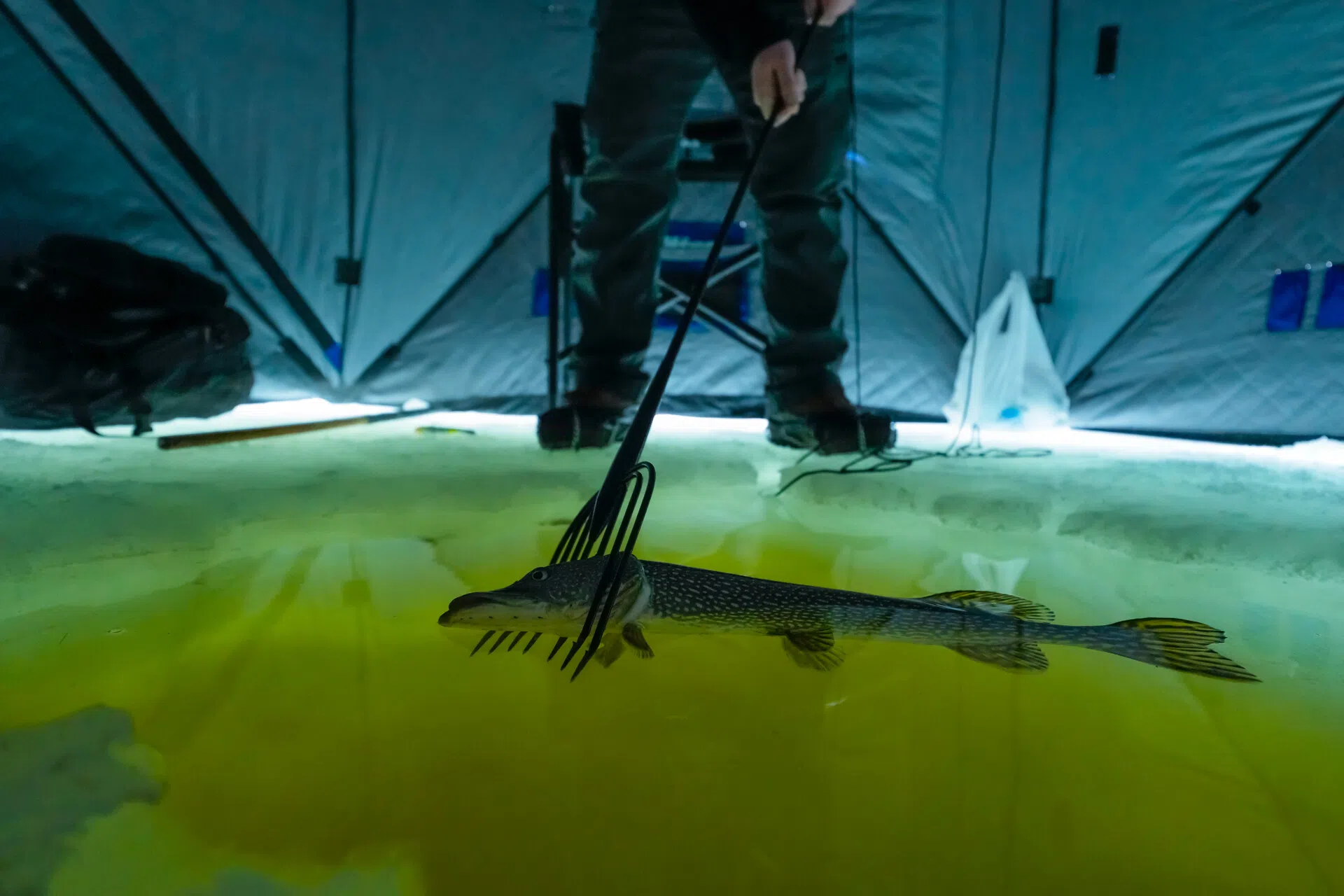
Ashley Peterson NDGF spear fishing
By Doug Leier
Have you ever been darkhouse spearfishing for pike? It’s relatively new compared to most outdoor recreation, having started a mere 25 years ago, but for those who have taken the opportunity it’s hard to compare.
I remember the first time I went spearfishing at Spiritwood Lake. Sitting still in a darkhouse was like nothing I’d ever done before. I’m no expert but when the first northern drifted into the decoy as I sat undetected, I locked up. Not surprisingly, I missed it.
Maybe it’s close to the thrill of calling turkeys into a decoy? Others might describe the rush like sitting undetected in a tree stand archery hunting for deer. I can attest it’s a rush of its own unique draw.
Decoying a pike isn’t the same as decoying ducks or holding a draw on a deer. None of those take place in the middle of a frozen lake with nothing but ice and cold water between you and the pike.
If you’ve ever watched a pike come in and attack a decoy, it’s incomparable. To get to that point is not easy. The combination of cold, snow and dark could be why the popularity of darkhouse spearfishing hasn’t, and likely never will, rival the sun, waves and water of summer fishing?
Looking at last year’s spearfishing statistics prove how a warmer winter with poor ice conditions results in lower participation and success.
Greg Power fisheries division chief highlights a few notes:
► 3,109 individuals registered – 2,018 residents, 1,091 nonresidents from 29 states including 716 from Minnesota (23%); despite an open winter, the number of registrants were
similar to the previous winter, which was greatly impacted by extreme cold weather and snowfall.
► 9,181 northern pike were harvested, the lowest number since 2010-11 and less than one-third of that harvested in 2017-18 (the record year).
► Average spearer was 42.8 years old and 88% were male.
► Survey respondents indicated participation in DHSF on a record 138 water bodies (up 32 from 2021-22).
► DHSF effort of the top 15 lakes accounted for nearly 75% of the effort with Sakakawea accounting for about 35% of the total effort (which basically equaled the effort of the
next 10 water bodies).
► Top 14 lakes accounted for more than 73% of the DHSF pike harvest with Sakakawea accounting for 28% of the total harvest. The top four waters (Sakakawea,
Devils Lake, Twin (LaMoure) and Horsehead lakes) accounted for 56% of the total pike harvest.
► Median and mean weights of the largest pike reported harvested by respondents were 10 and 10.5 pounds respectively. These metrics are the highest ever recorded.
► 2022-23 was the first winter that the taking of walleye (in addition to pike and rough fish) during DHSF was legal for Devils Lake, Stump Lake and the Missouri River System including lakes Sakakawea and Oahe. For this past winter (23-24), the following number of spearers harvested the following number of walleye: Sakakawea (88 spearers and 218 walleye), Devils Lake (26 spearers and 54 walleye), Missouri River (three spearers and three walleye) and Stump Lake(one spearer and one walleye).
2024-25 North Dakota Darkhouse Spearing
Individuals required to possess a valid fishing license (age 16 and older) to darkhouse spearfish must first register online at the North Dakota Game and Fish Department website, gf.nd.gov.
Darkhouse spearing is allowed for all anglers with a valid fishing license and for youth under age 16.
Northern pike and nongame fish are the only legal species statewide, while walleye can be speared at Stump Lake and the Devils Lake complex south of U.S. Highway 2 and the Missouri River System (including lakes Oahe and Sakakawea and the Missouri River) up to the first tributary bridge.
Spearers and anglers are reminded that materials used to mark holes must be in possession as soon as a hole greater than 10 inches in diameter is made in the ice.
Registration and full details can be found on the Game and Fish Department’s website at gf.nd.gov.




Comments